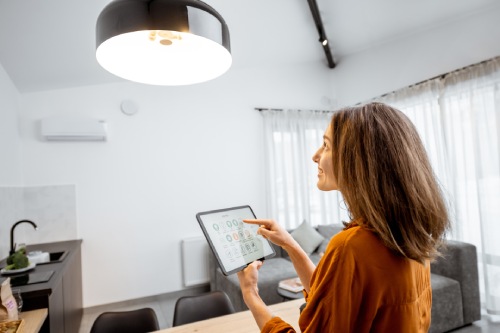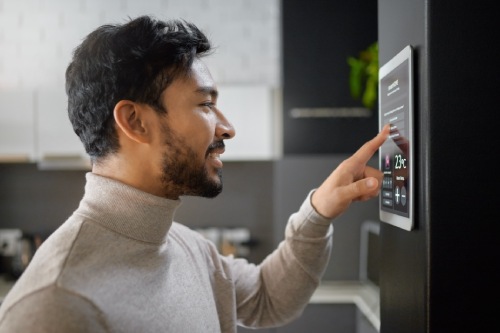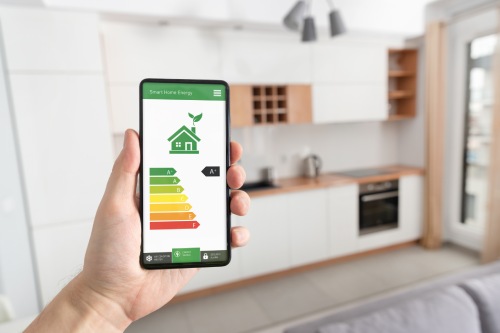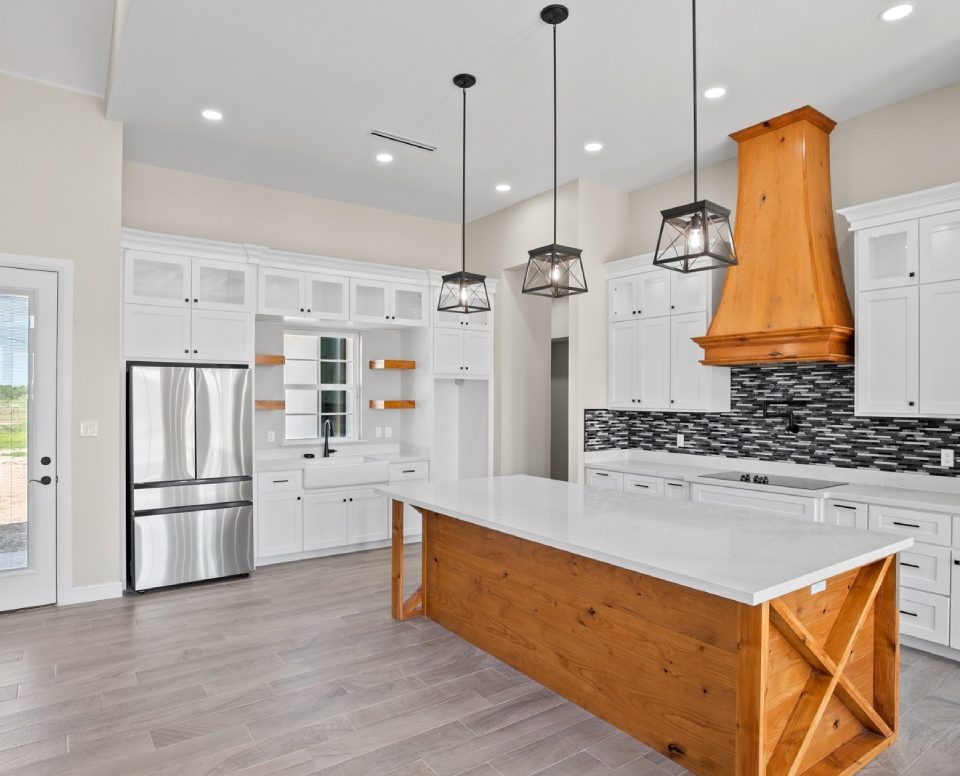
Smart homes are touted as the future of modern construction for a reason. By 2025, 3 in 5 US households are projected to adopt smart home technology.
In essence, a smart home utilizes interconnected devices and appliances that can be controlled remotely via your smartphone or tablet. This translates into a plethora of benefits for homeowners, the environment, and even the construction industry itself. Let’s delve deeper into how smart homes are shaping the future of home construction.

Benefits of Smart Home Construction for the Homeowners
Consumers are demanding smart homes because of the convenience they offer. The cost of these technologies has reduced drastically over the years, enabling middle and even lower-income families to adopt these technologies with ease.
If you’re planning to adopt smart appliances for your home, here are the benefits you can expect:
Remote accessibility
With smart home technology, homeowners can control and monitor their home systems from anywhere with an internet connection. Whether you’re at work, on vacation, or simply lounging on the couch, you can adjust your thermostat, check security camera feeds, or even unlock the door for a visitor—all from your smartphone or tablet. You can even grant or revoke access to certain sections of your home from your fingertips. This is really valuable when there’s an important Amazon parcel at the doorstep, but you’re out at work.
Voice control
Voice command isn’t limited to Iron Man anymore. Now, you have the power to control your environment with simple commands. Integration with virtual assistants like Amazon Alexa, Google Assistant, or Apple’s Siri allows for hands-free operation of smart devices. You can simply speak commands to control lighting, play music, set timers, or even order groceries, making mundane tasks effortless and efficient.

Automation and scheduling
Smart home systems enable the automation of routine tasks based on pre-set schedules or triggers. For example, you can program your lights to turn on gradually in the morning to simulate sunrise or schedule your thermostat to adjust temperatures throughout the day to optimize comfort and energy savings. Automation also helps you out with everyday household chores. Smart ovens allow you to preheat or even start cooking a meal remotely, saving you time when you finally get home. Smart vacuums can keep your floors clean even when you’re not around, and smart washing machines can notify you when your laundry cycle is complete, eliminating the need for constant checking.
Personalized settings
Smart homes offer personalized experiences tailored to individual preferences. Through machine learning algorithms, these systems can learn your habits and preferences over time, adjusting settings accordingly. For instance, smart thermostats can learn your temperature preferences and automatically adjust settings to ensure optimal comfort without manual intervention. The Google Nest thermostat is gaining popularity because of this reason.
Integration and compatibility
Smart home technology allows for seamless integration and compatibility between different devices and systems. This means you can control multiple aspects of your home—such as lighting, heating, security, and entertainment—from a single interface, simplifying management and enhancing overall convenience.
Remote monitoring and alerts
Smart home security systems provide real-time monitoring of your property, sending alerts to your smartphone in case of suspicious activity or emergencies. Whether it’s a potential break-in, a smoke alarm, or a water leak, you’ll be promptly notified, allowing for quick response and peace of mind.
Energy monitoring and management
Smart energy monitoring tools help homeowners track their energy usage in real-time and identify areas where efficiency can be improved. By providing insights into energy consumption patterns, smart homes empower users to make informed decisions that lead to cost savings and environmental benefits.
By asking custom home builders in RGV to incorporate these smart home features, you can transform your living space into a haven of effortless convenience, freeing up your time and energy for the things that truly matter.

Benefits of Smart Home Construction for the Environment
We’ve all heard the buzz about smart homes, but what about their impact on the environment? Are they just a fancy tech trend, or can they truly make a difference? The answer is a resounding yes! Not just consumers, smart homes benefit the environment in several ways. These are:
Lower energy consumption
Imagine leaving the lights on accidentally or blasting the air conditioning while you’re at work. Smart thermostats and lighting systems can learn your routines and preferences, automatically adjusting settings to save energy. Nest Learning thermostats can save anywhere from 10% to 12% energy on heating and 15% on cooling. This translates to $131 to $145 in savings every year.
Conserve water
Water is a valuable resource that every life form on earth depends on for survival. Thus, conserving water translates to conserving the ecosystem. By integrating smart appliances and devices, such as energy-efficient lighting and water-saving fixtures, smart homes help conserve resources like water and electricity. For example, smart irrigation systems use weather data to adjust watering schedules, reducing water usage by up to 50% compared to traditional systems, as reported by the Environmental Protection Agency. If you have a big lawn or garden, you can opt for these systems. Water scarcity is becoming a major problem in Mission, TX, and smart tech can help with that.
Reduced carbon emission
Smart homes contribute to lower carbon emissions by reducing energy consumption and reliance on fossil fuels. According to the World Green Building Council, buildings are responsible for approximately 39% of global CO2 emissions, but smart home technologies can help mitigate this impact. For instance, a study found that smart home automation can lead to 13% in CO2 emissions.
Better waste management
While still in the nascent stages (at the residential level), smart home technology can potentially aid waste management. Using cameras and AI, smart homes could automatically sort your waste at the source, eliminating sorting confusion and contamination in recycling bins. The technologies can also analyze your waste habits and suggest ways to reduce waste or improve recycling practices. The San Francisco Department of Public Works reduced overflowing waste by about 80% with the help of smart technologies. It’s a matter of time before such capabilities come to your home.
So, if you’re an environment-conscious person, smart home tech should be at the top of your desired list.

Benefits of Smart Home Construction for the Construction Industry
Lastly, smart home technology offers numerous benefits to the construction industry, revolutionizing how homes are designed, built, and managed.
Smart home technology streamlines construction processes and improves operational efficiency. For example, prefabricated smart home components, such as integrated wiring systems and automated lighting fixtures, can be installed more quickly and with fewer errors than traditional building methods. This leads to shorter construction timelines and reduced labor costs.
Smart homes are also a major selling point in today’s saturated home market.
A survey by Rent.com found that 82% of renters demand at least one smart home feature when looking for rentals. Likewise, 3 in 4 potential home buyers are willing to pay more for a smart home.
So, a smart home can essentially future-proof your home.
Build Your Smart Home With Us!
Overall, smart homes are not just an internet-driven fad—they represent a significant step towards sustainable living. With the potential to save money on utility bills while also helping the planet, smart homes are a win-win solution for homeowners and the environment alike.
So take a step towards a smart home by incorporating smart technologies for your new home in McAllen. Discover the future of home construction with Guzman Construction. Contact us today to learn more.




